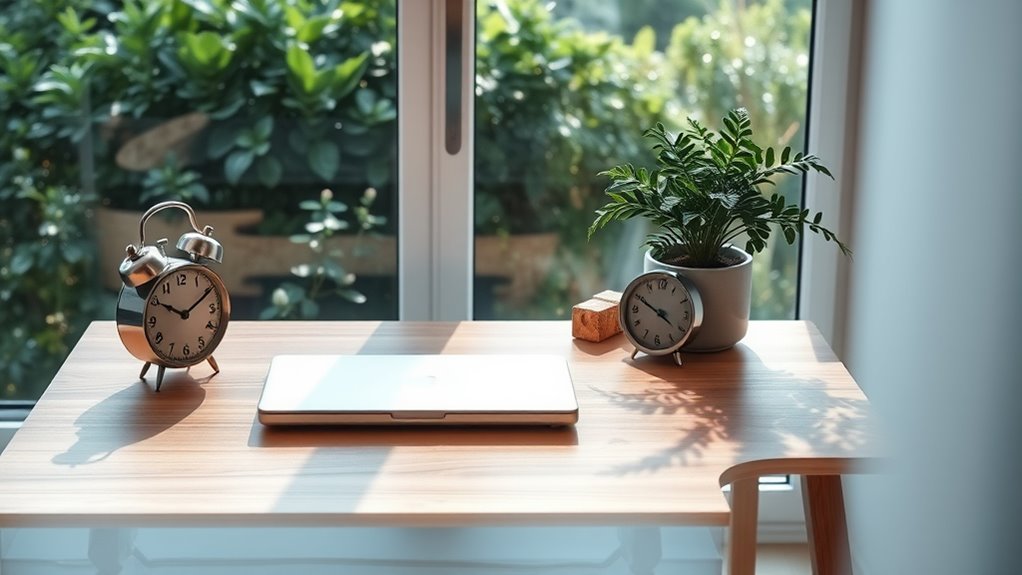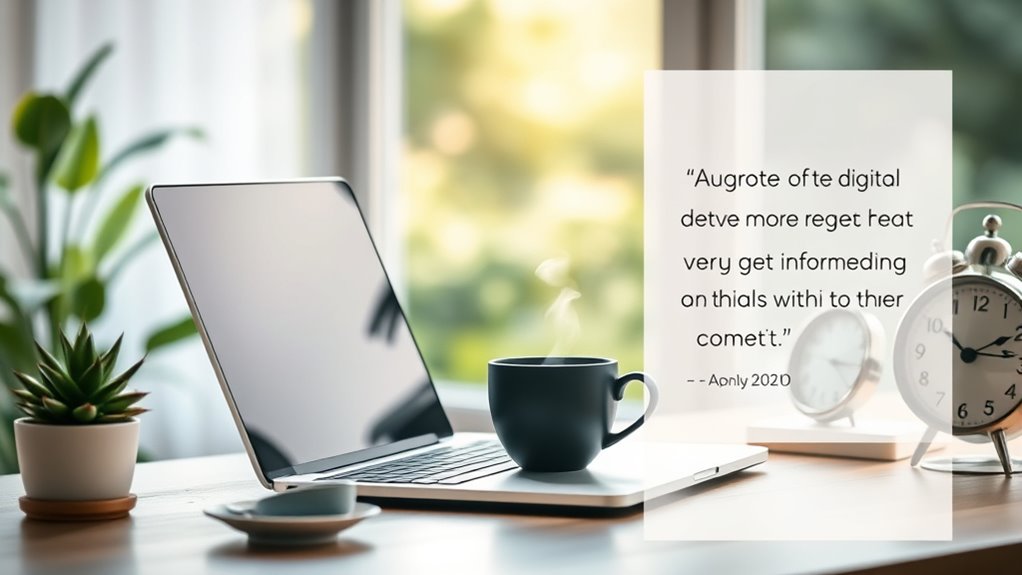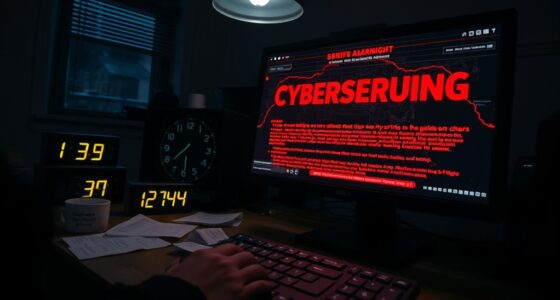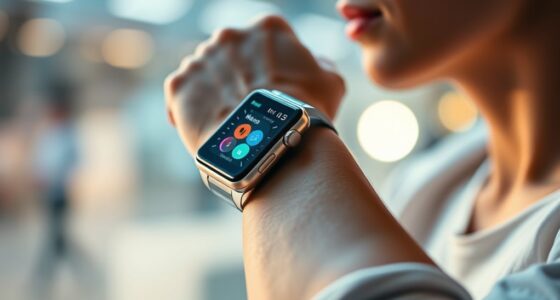Many tech leaders and digital wellbeing pioneers stress the importance of unplugging to protect your mental clarity and creativity. They suggest setting clear boundaries, limiting screen time, and engaging in offline activities like outdoor walks or creative hobbies. Mindfulness and scheduled breaks help prevent burnout and digital fatigue. If you want practical tips and inspiring quotes from industry experts on managing your digital life, you’ll find more insights just ahead.
Key Takeaways
- Tech leaders emphasize managing screen time and setting boundaries to prevent burnout and maintain mental clarity.
- Many advocate for digital minimalism and intentional technology use over mindless scrolling.
- Unplugging periodically fosters creativity, focus, and real-world connections, helping reduce digital fatigue.
- Mindfulness practices and scheduled digital breaks are recommended to stay present and control device habits.
- Recognizing the toll of constant connectivity, leaders promote offline experiences and moderation for overall well-being.
Insights From Silicon Valley Innovators
Have Silicon Valley innovators embraced the idea of a digital detox, or do they see it as a luxury they can’t afford? Many recognize the toll excessive screen time and social media take on their focus and well-being. Some actively set boundaries, like limiting daily social media use, to regain clarity and control. They understand that constant notifications and endless scrolling can lead to burnout and distract from innovation. While they value connectivity, they also see the importance of unplugging periodically to recharge mentally. For them, a digital detox isn’t about abandoning technology but creating intentional breaks. They prioritize mindful usage, knowing that stepping away from screens can boost creativity and productivity, ultimately making them more effective in their work and personal lives. Additionally, they often draw inspiration from natural environments and outdoor activities, recognizing the mental refreshment that comes from disconnecting in nature.
Wisdom From Tech Entrepreneurs

What insights do tech entrepreneurs offer about digital detoxing? Many emphasize the importance of digital minimalism, simplifying your tech use to focus on what truly matters. They advise setting boundaries, like scheduled breaks from screens and limiting notifications, to foster tech mindfulness. Entrepreneurs like Cal Newport advocate for intentionally reducing digital clutter to improve focus and mental clarity. They suggest that unplugging isn’t about abandoning technology but about cultivating a healthier relationship with it. By practicing digital minimalism, you can create space for meaningful interactions and self-reflection. These leaders believe that regular digital detoxes help prevent burnout, boost creativity, and restore balance. Additionally, understanding the risks and rewards of digital detoxing can help you develop more effective strategies. Ultimately, their wisdom encourages you to be deliberate with your tech habits, ensuring your digital life enhances rather than dominates your well-being.
Quotes From Pioneers in Digital Wellbeing

Listening to what pioneers in digital wellbeing say can inspire you to find better balance. Their quotes highlight the importance of mindfulness and setting limits in a tech-driven world. These insights can help you prioritize your mental health amid constant connectivity. Incorporating nutrient-rich ingredients into a balanced routine can further support mental clarity and overall wellbeing.
Founder Insights on Balance
How do pioneers in digital wellbeing define true balance in a world dominated by constant connectivity? They emphasize mindful leadership—knowing when to step back and set boundaries—rather than relentless hustle. Founders often highlight that unplugged innovation thrives when you create space away from screens, allowing fresh ideas to emerge. These pioneers believe that sustainable success requires intentional breaks to recharge mental clarity, fostering resilience and creativity. They advocate for integrating moments of solitude into daily routines, demonstrating that balance isn’t about avoiding technology but using it consciously. Recognizing the importance of screen time management can help individuals maintain mental well-being and prevent burnout. For you, this means leading with awareness, prioritizing mental health, and valuing downtime as essential to meaningful progress. Ultimately, these insights show that true balance blends mindful leadership with strategic unplugging, fueling innovation without burnout.
Innovators Promoting Mindfulness
Pioneers in digital wellbeing emphasize that mindfulness isn’t just a personal practice but a vital leadership tool. They highlight the importance of managing screen time and establishing clear digital boundaries to foster healthier habits. These innovators believe that mindful leaders set an example by consciously unplugging and encouraging their teams to do the same. By staying present and aware, you can reduce digital overwhelm and improve focus. They stress that practicing mindfulness helps you recognize when technology becomes a distraction and empowers you to create intentional digital habits. Ultimately, prioritizing mindfulness enables you to lead with clarity and purpose while fostering a balanced relationship with technology. Their quotes serve as a reminder that mindful leadership begins with self-awareness and deliberate digital boundaries. Incorporating tools like digital detox strategies can further support sustainable tech habits for leaders and teams alike.
Leaders Emphasize Digital Limits
Leaders in digital wellbeing consistently stress the importance of setting clear digital limits to maintain focus and prevent burnout. They emphasize managing your screen time so you can stay productive and present. Establishing digital boundaries helps you control when and how you engage with devices, safeguarding your mental health. Pioneers in this space warn against endless scrolling and suggest specific time frames for digital use. By defining limits, you create a healthier balance between online and offline life. These leaders highlight that setting boundaries isn’t about restriction but about empowering you to regain control over your digital habits. Incorporating well-being tips into your routine can further support a balanced digital lifestyle. Ultimately, prioritizing your digital boundaries allows you to reduce stress, improve focus, and enjoy more meaningful offline experiences.
Perspectives From Industry Thought Leaders

Industry thought leaders share their personal practices for managing digital stress, giving you practical ideas to try. They emphasize finding a balance between boosting productivity and maintaining wellbeing, showing it’s possible to succeed without burnout. Their insights inspire you to adopt mindful tech use that supports both your work and mental health. Incorporating mindful tech use strategies can further enhance your overall wellbeing and reduce digital fatigue.
Leaders’ Personal Practices
Many thought leaders in the tech and business worlds are actively adopting personal practices to combat digital overload. They set clear tech boundaries, such as designated screen-free times and spaces, to reduce unnecessary screen time. Some leaders limit their daily device use or turn off notifications to stay present with their surroundings and avoid constant distractions. Others establish routines like no devices during meals or before bed, helping them disconnect and recharge. By consciously managing screen time, these leaders prioritize mental clarity and focus. Their personal practices show that creating boundaries isn’t just about productivity; it’s about safeguarding well-being. If you want to follow their example, start by setting simple limits to regain control over your digital habits. Additionally, embracing sustainable living principles can reinforce healthier digital habits that benefit both mental health and the environment.
Balancing Productivity and Wellbeing
As more thought leaders adopt personal boundaries around technology, they also recognize the importance of balancing productivity with their overall wellbeing. Managing screen time becomes essential, preventing burnout and fostering mental clarity. Many advocate for digital minimalism—focusing on intentional tech use—so you can stay productive without sacrificing your health. Leaders suggest setting specific times for checking emails or social media, ensuring technology serves your goals rather than dictating your day. Incorporating crochet styles for locs as a form of creative expression can also offer a relaxing break from digital devices. By prioritizing quality over quantity, you reduce distractions and create space for reflection and rejuvenation. Striking this balance helps you stay efficient while safeguarding your mental and emotional wellbeing, making it possible to thrive professionally without losing sight of your personal health.
Inspiring Mindful Tech Use
Thought leaders across various fields emphasize the importance of mindful tech use to foster well-being and productivity. They encourage you to set clear tech boundaries, such as limiting screen time during specific hours or activities. By doing so, you create space for meaningful offline experiences and reduce digital fatigue. Industry experts suggest regularly evaluating your device habits and adjusting them to prioritize mental clarity. Practicing mindfulness while using technology helps you stay present and avoid mindless scrolling. These leaders also recommend strategies like scheduled digital breaks and turning off notifications to maintain control over your screen time. Incorporating mindfulness techniques into your daily routine can significantly enhance your ability to manage digital exposure consciously. Ultimately, adopting a mindful approach to tech use empowers you to balance connectivity with mental health, making your digital interactions more intentional and beneficial.
Reflections From Software Developers and Creators

Software developers and creators often recognize that their own work can contribute to the digital overload they aim to address. They’re aware that excessive screen time can lead to burnout and distraction, even among those who build these tools. Many advocate for digital minimalism, emphasizing intentional technology use over mindless scrolling. Some share that limiting their own digital consumption helps maintain focus and mental clarity, inspiring them to design apps that promote healthier habits. They understand that reducing unnecessary notifications and simplifying interfaces can benefit users’ well-being. Ultimately, these developers acknowledge that balancing innovation with mindfulness is key to creating a healthier digital environment—for themselves and others. Their reflections serve as a reminder that tech leaders are also steering through the importance of unplugging.
Lessons From Tech CEOS and Founders

What can you learn from the habits of tech CEOs and founders about maintaining digital balance? Many prioritize managing their screen time to prevent tech addiction. They set boundaries by designating tech-free times or spaces, like no devices during meals or before bed. These leaders often practice intentional unplugging to recharge mentally and focus on real-world connections. They recognize that constant connectivity can lead to burnout and diminish productivity. By modeling discipline around their device use, they demonstrate that controlling screen time isn’t just about avoiding distraction but about safeguarding overall well-being. Their approach emphasizes that a conscious effort to unplug isn’t a sign of weakness but a strategic move to stay sharp, creative, and emotionally balanced amid a tech-driven world.
Recommendations From Digital Wellness Advocates

Digital wellness advocates offer practical strategies to help you establish healthier digital habits. They recommend setting clear digital boundaries to prevent excessive screen time and create a healthier balance. Start by designating specific times to check your devices, avoiding constant notifications that disrupt your focus. Use app timers or device settings to limit your screen time, especially on social media or entertainment platforms. Create tech-free zones in your home, such as the bedroom or dining area, to encourage meaningful offline interactions. Prioritize face-to-face conversations and outdoor activities to reconnect with the world around you. These small, intentional changes help you regain control over your digital life, reduce stress, and foster well-being. Implementing these recommendations can lead to a more mindful, balanced relationship with technology.
Frequently Asked Questions
How Do Tech Leaders Personally Implement Digital Detox Routines?
You can implement digital detox routines by setting mindful boundaries, like designating tech-free zones in your home. Tech leaders often prioritize offline activities, such as outdoor walks or reading, to disconnect. They also schedule regular breaks from screens and turn off notifications during certain hours. By creating these mindful boundaries, you guarantee time for reflection and real connection, helping you recharge without digital distractions.
What Are Common Challenges Faced When Unplugging From Technology?
Imagine standing at a busy intersection of your work and personal life, where screens cast a constant glow. When you unplug, you often face challenges like screen fatigue and struggle to maintain work-life balance. The temptation to check notifications lingers like a faint hum, making it hard to disconnect fully. These hurdles test your resolve, but overcoming them can bring clarity, focus, and a healthier relationship with technology.
How Does Digital Detox Impact Mental Health and Productivity?
When you take a digital detox, you often experience improved mental clarity and reduced stress. Unplugging helps you break free from constant notifications and digital noise, allowing your mind to reset. This boost in mental well-being can increase your focus and productivity, making tasks feel more manageable. As a result, you become more present and balanced, directly benefiting your overall mental health and work efficiency.
Are There Specific Tools or Apps Recommended for Digital Detoxing?
Imagine your devices are a tangled web pulling you in. You can cut through this by trying screen-free weekends and using mindfulness apps like Headspace or Calm. These tools help you disconnect and focus on the present moment. They’re like a gust of fresh air in a digital storm, guiding you toward healthier habits and more mindful living. Give them a shot, and reclaim your time and peace.
How Can Organizations Promote Healthier Tech Habits Among Employees?
You can promote healthier tech habits among employees by encouraging remote work policies that prioritize breaks and set boundaries. Foster a culture that values employee wellness by implementing regular digital detox initiatives, like scheduled unplugging times. Provide resources and training on managing screen time effectively. When you support these practices, you help your team maintain better focus, reduce burnout, and improve overall well-being, creating a more productive and healthier work environment.
Conclusion
As you navigate the busy digital world, remember that unplugging isn’t just a break — it’s a breath of fresh air for your mind. These tech leaders’ quotes remind you that even the brightest innovators find value in stepping back and recharging. Think of digital detox as hitting the pause button on a fast-paced movie; it lets you enjoy the story of your life more fully. So, take that time off and reconnect with what truly matters.









